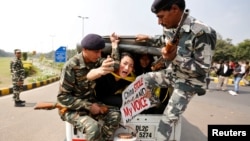In a protest against China’s rule of Tibet, a Tibetan man set himself on fire Wednesday and died in Meruma Township in Ngaba County, Sichuan Province, eastern Tibet.
Tibetan sources and social media said Tsekho, a father of two, set himself ablaze around 5 p.m. local time.
Tsekho's protest occurred just days before the anniversary of the March 10, 1959, Tibetan Uprising Day, when thousands of Tibetans rose against China’s military and declared Tibet's independence.
Tibetan exile President Lobsang Sangay expressed his deep concern Wednesday at reports of yet another self-immolation protest.
“Despite repeated appeals from the Central Tibetan administration not to resort to drastic measures, at least 152 Tibetans, including Tsekho, have set themselves on fire since 2009 in Tibet,” Sangay said Such protest are usually fatal.
He urged the Chinese government to “heed the calls of Tibetans” and allow His Holiness the Dalai Lama to return to Tibet. The head of the Tibetan government-in-exile said the dispute over Tibet “can be best resolved by resuming dialogue with the Tibetan representatives.”
This is the first reported self-immolation protest of 2018. The last case occurred in December 2017 and involved a man called Kunbey who also lived in Meruma Township. A local source described Tsekho, who was in his 40s, as a strong and optimistic character with great interest in the Tibetan cause.
While Tsekho's death has been confirmed, the whereabouts of his body is currently unknown. He is survived by his elderly father, his wife and two daughters.
Since 2009, more than 150 Tibetans have set themselves on fire to protest China's military occupation — which has been in force since 1950 — as well as human rights abuses and restrictions on Tibet's religious and cultural freedoms.
Free Tibet's director Eleanor Byrne-Rosengren said in a release, “As Tibetans around the world prepare to commemorate the 59th anniversary of the national uprising in 1959, another protester inside Tibet has given his life to protest the ongoing Chinese occupation. Chinese authorities are quick to complain about its hurt feelings whenever anyone mentions Tibet or human rights. Yet Tibetans suffer far more tangible pain on a daily basis. Every time a politician or a company defers to one of China’s melodramatic objections, they are telling the world that they believe a Tibetan life is worth less than the Chinese government’s feelings. We cannot just stand by and condone this callous indifference.”




